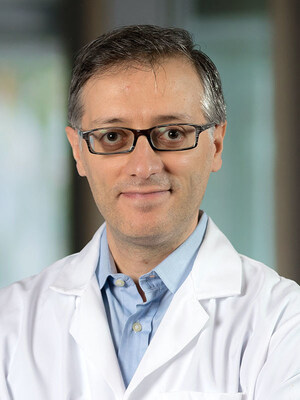High Triglyceride Levels Found to Predict Stroke in Older Women
A Stronger Link than Cholesterol Levels to Ischemic Stroke
BRONX, N.Y., Feb. 2, 2012 /PRNewswire-USNewswire/ -- In a surprising finding with significant implications for older women, researchers at Albert Einstein College of Medicine of Yeshiva University and NYU School of Medicine have found that high levels of triglycerides (blood fats) are the strongest risk factor for the most common type of stroke in older women – more of a risk factor than elevated levels of total cholesterol or of low-density lipoprotein (LDL) cholesterol (known as "bad" cholesterol). The study appears online today in Stroke.
Strokes involve the sudden loss of blood flow to an area of the brain. According to the U.S. Centers for Disease Control and Prevention, nearly 800,000 Americans suffer a stroke each year. Stroke is the third leading cause of death for both men and women in the United States, accounting for more than 140,000 deaths per year. Ischemic strokes, the type assessed in this study, account for more than eight in ten strokes over all and occur when blood clots obstruct blood vessels to the brain. Nearly three-quarters of all strokes occur in those over 65.
Abnormal levels of triglycerides and other so-called lipid biomarkers have long been associated with increased risk for heart disease and atherosclerosis (plaque buildup inside arteries). The study's senior author, Sylvia Wassertheil-Smoller, Ph.D., said that "until this study, researchers had not examined how these lipid biomarkers are independently related to stroke risk in a single group of people." Dr. Smoller is head of the division of epidemiology, professor of epidemiology & population health, and the Dorothy and William Manealoff Foundation and Molly Rosen Chair in Social Medicine at Einstein.
The Einstein researchers analyzed data from the Hormones and Biomarkers Predicting Stroke (HaBPS) study, which consists of women enrolled in the Women's Health Initiative (WHI), the landmark National Institutes of Health study that has monitored the health of more than 90,000 postmenopausal women nationwide over a period of 15 years. HaBPS is comprised of the first 972 women who experienced an ischemic stroke while participating in the WHI. These women were matched with a control group of 972 participants who had not had strokes. All the women had donated blood samples when they first enrolled in the WHI, and these samples were analyzed for lipid biomarkers. (Dr. Wassertheil-Smoller is principal investigator of WHI and HaBPS at Einstein.)
"It's important to note, many of the traditional measures of cholesterol that physicians use including total cholesterol and LDL cholesterol were not associated with risk of ischemic stroke," said lead author of the study, Jeffrey S. Berger, M.D., assistant professor of medicine at the NYU School of Medicine. "Currently, there is a lack of data that lowering triglyceride levels can help reduce the risk. We believe future studies of people with elevated triglyceride levels are warranted to show the reduction of ischemic stroke."
Dr. Wassertheil-Smoller and her colleagues found that women in the highest quarter of baseline triglyceride levels were nearly twice as likely to have suffered an ischemic stroke as women in the lowest quarter of triglyceride values. Levels of total cholesterol and LDL ("bad") cholesterol were not associated with stroke risk.
"The bottom line is that postmenopausal women and their physicians need to pay attention to triglyceride levels," Dr. Wassertheil-Smoller said. "We already know that women with elevated levels of triglycerides face a greater risk for heart disease and heart attacks than men do. This study has underlined the importance of abnormal triglyceride levels by establishing them as an independent risk factor for stroke." Elevated triglyceride levels can be triggered by genetic factors or behavioral habits but can be successfully treated with medication and dietary and lifestyle changes, Dr. Smoller pointed out.
The paper is titled "Lipid and Lipoprotein Biomarkers and the Risk of Ischemic Stroke in Postmenopausal Women." Co-authors include lead author Jeffrey Berger, M.D., M.S., NYU School of Medicine; Aileen McGinn, Ph.D., and Robert Kaplan, Ph.D., Einstein; Barbara V. Howard, Ph.D., MedStar Research Institute, Washington, D.C.; Lewis Kuller, M.D., Dr.PH., University of Pittsburgh, Pittsburgh, PA; JoAnn E. Manson, M.D., Dr.PH., Brigham and Women's Hospital, Boston, MA; Jim Otvos, Ph.D., Liposcience, Inc, Raleigh, NC; J. David Curb, M.D., John A. Burns School of Medicine, University of Hawaii at Manoa, Honolulu, HI; Charles B. Eaton, M.D., Memorial Hospital of Rhode Island, Pawtucket, RI; John K. Lynch, D.O., M.P.H., National Institute of Neurological Disorders and Stroke, Section on Stroke Diagnostics and Therapeutics; Daniel M. Rosenbaum, M.D., SUNY Downstate, Brooklyn, NY. The WHI is funded by the National Lung, and Blood Institute and HaBPS is funded by the National Institute of Neurological Disorders and Stroke.
About Albert Einstein College of Medicine of Yeshiva University
Albert Einstein College of Medicine of Yeshiva University is one of the nation's premier centers for research, medical education and clinical investigation. During the 2011-2012 academic year, Einstein is home to 724 M.D. students, 248 Ph.D. students, 117 students in the combined M.D./Ph.D. program, and 368 postdoctoral research fellows. The College of Medicine has 2,522 full time faculty members located on the main campus and at its clinical affiliates. In 2011, Einstein received nearly $170 million in awards from the NIH. This includes the funding of major research centers at Einstein in diabetes, cancer, liver disease, and AIDS. Other areas where the College of Medicine is concentrating its efforts include developmental brain research, neuroscience, cardiac disease, and initiatives to reduce and eliminate ethnic and racial health disparities. Its partnership with Montefiore Medical Center, the University Hospital and academic medical center for Einstein, advances clinical and translational research to accelerate the pace at which new discoveries become the treatments and therapies that benefit patients. Through its extensive affiliation network involving Montefiore, Jacobi Medical Center – Einstein's founding hospital, and five other hospital systems in the Bronx, Manhattan, Long Island and Brooklyn, Einstein runs one of the largest post-graduate medical training programs in the United States, offering approximately 155 residency programs to more than 2,200 physicians in training. For more information, please visit www.einstein.yu.edu and follow us on Twitter @EinsteinMed.
SOURCE Albert Einstein College of Medicine
WANT YOUR COMPANY'S NEWS FEATURED ON PRNEWSWIRE.COM?
Newsrooms &
Influencers
Digital Media
Outlets
Journalists
Opted In






Share this article